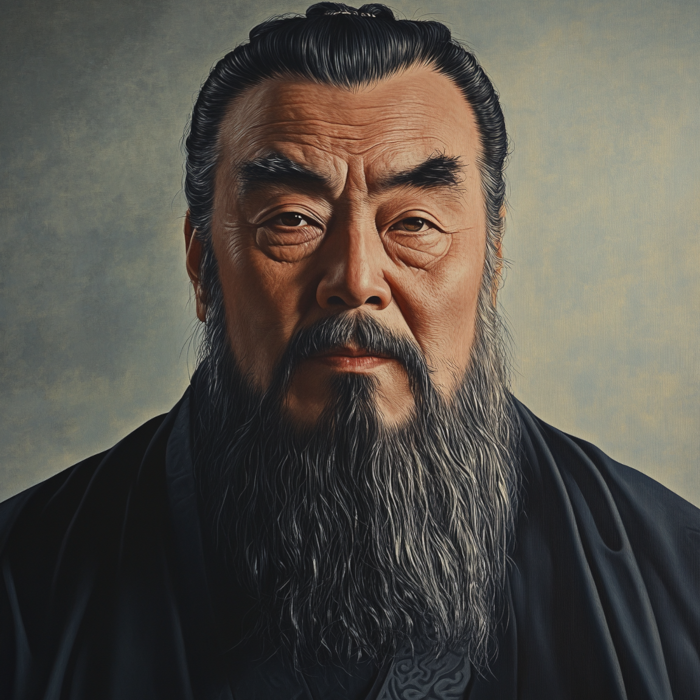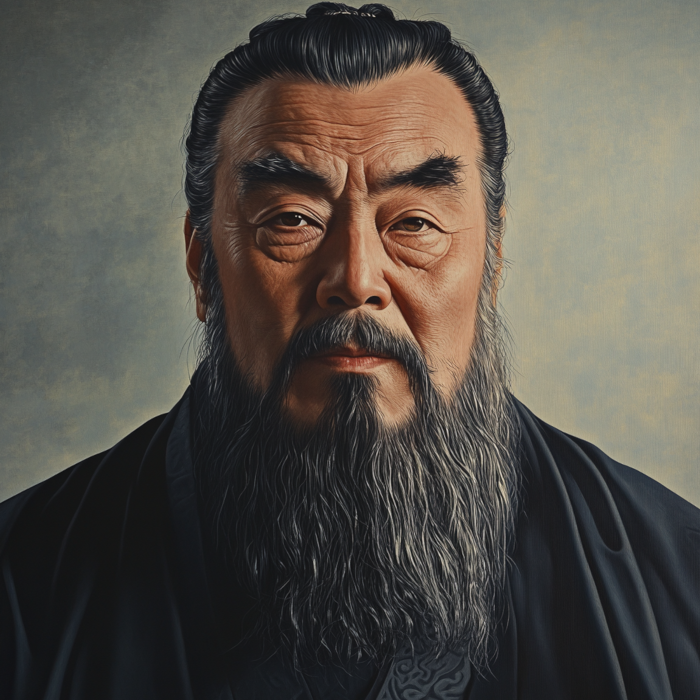


Confucius (551–479 BCE) was a Chinese philosopher, teacher, and political figure whose ideas have profoundly influenced Chinese culture, philosophy, and governance for over two millennia. He is best known for his teachings on ethics, morality, and proper social relationships, which are recorded in the Analects (Lunyu). Confucianism, the philosophical system based on his teachings, became the foundation of Chinese society and government and has had a lasting impact on East Asian civilizations.
Birth: Confucius was born in 551 BCE in the state of Lu, in what is now Shandong Province, China. His birth name was Kong Qiu, and he is also known as Kong Fuzi or Master Kong, which was Latinized as "Confucius" by Jesuit missionaries in the 16th century.
Family Background: Confucius came from a noble but impoverished family. His father, Kong He, was a military officer who died when Confucius was very young. His mother, Yan Zhengzai, raised him in poverty, but she ensured he received a good education.
Education: Confucius was largely self-taught and became well-versed in a wide range of subjects, including literature, history, music, and the rites and rituals of Zhou dynasty culture. His early experiences and education shaped his belief in the importance of learning and moral development.
Teaching and Early Career: Confucius began his career as a teacher, and his reputation as a wise and knowledgeable educator grew quickly. He attracted a group of dedicated disciples who followed him and recorded his teachings. Confucius believed that education was the key to moral improvement and that anyone, regardless of social status, could benefit from it.
Political Career: Confucius also sought to apply his ideas to government and public life. He held various minor governmental positions in the state of Lu, where he attempted to implement his ethical and moral principles. However, his efforts to reform the government were met with resistance, and after becoming disillusioned with the corruption and lack of virtue among the ruling class, he chose to leave Lu and travel to other states in search of a ruler who would heed his advice.
Return to Lu and Final Years: After years of travel, Confucius returned to Lu, where he spent his later years teaching and compiling important classical texts, such as the Book of Documents, Book of Odes, and the Spring and Autumn Annals. He died in 479 BCE, leaving behind a legacy that would shape Chinese thought for centuries.
These relationships were seen as the foundation of a harmonious society, with each person fulfilling their role and duties in accordance with their position.
Ren (Humaneness or Benevolence): The central concept in Confucian ethics is ren, often translated as "humaneness," "benevolence," or "virtue." Ren is the quality of compassion and empathy toward others, and Confucius taught that it is the highest virtue that one should strive to cultivate. It involves treating others as one would wish to be treated and acting with kindness and consideration.
Li (Ritual and Proper Conduct): Li refers to the rituals, customs, and norms that govern proper behavior in society. Confucius believed that following li would lead to social harmony and that rituals were important for maintaining respect and order. Li also encompassed a broader sense of propriety, including manners, ceremonies, and moral conduct.
Xiao (Filial Piety): Xiao is the virtue of filial piety, which involves respect and care for one's parents and ancestors. Confucius considered filial piety the foundation of moral behavior and believed that it was essential for maintaining social order and harmony.
Junzi (The Superior Person): Confucius taught that the goal of moral cultivation was to become a junzi, or "superior person" (sometimes translated as "gentleman" or "noble person"). A junzi is someone who embodies the virtues of ren, li, and xiao, and who acts with integrity, humility, and wisdom. The junzi is contrasted with the xiaoren ("small person"), who acts selfishly and without regard for others.
Government and Leadership: Confucius believed that rulers should lead by moral example rather than by force or coercion. He advocated for a government based on virtue and benevolence, where leaders acted with righteousness and justice. A ruler who practiced ren would inspire loyalty and harmony among the people.
Confucianism: Confucius' teachings laid the foundation for Confucianism, which became one of the most influential philosophies in Chinese history. Confucianism was not just a philosophy but also a system of social and political thought that shaped Chinese culture, education, and government for centuries. It emphasized the importance of education, moral development, and the cultivation of virtues in both personal and public life.
Influence on East Asia: Confucianism spread beyond China to Korea, Japan, Vietnam, and other parts of East Asia, where it influenced local cultures and political systems. Confucian ideals became integrated into the civil service examinations, which determined entry into government positions, making Confucianism a central part of governance in these societies.
The Analects: The Analects (Lunyu), a collection of sayings and ideas attributed to Confucius and his disciples, is the primary source of Confucian thought. Compiled by his followers after his death, the Analects provide insights into Confucius' views on ethics, governance, and proper conduct. It remains one of the most studied and revered texts in Chinese literature and philosophy.
Enduring Relevance: Confucianism continued to influence Chinese society through various dynasties, particularly during the Han, Tang, Song, and Ming dynasties, when it was often the official ideology. In the modern era, Confucian values still play a significant role in East Asian cultures, and Confucius' teachings continue to be studied and respected worldwide.
Criticism and Challenges: Confucianism has faced criticism, particularly in the 20th century, during movements like the May Fourth Movement in China, which rejected traditional Confucian values in favor of modernization and Western ideas. Critics argue that Confucianism's emphasis on hierarchy and filial piety can perpetuate social inequality and stifle individual freedom. However, Confucianism has also undergone reinterpretation and adaptation to address contemporary concerns.
Confucius is one of the most influential figures in the history of Chinese thought, and his teachings have shaped the moral, social, and political fabric of East Asia for over two millennia. His emphasis on ethics, proper conduct, and the cultivation of virtue remains relevant in discussions of morality, leadership, and human relationships today. Confucius' vision of a harmonious society, grounded in compassion, respect, and moral integrity, continues to inspire people around the world.

We use cookies
We use cookies and other tracking technologies to improve your browsing experience on our website, to show you personalized content and targeted ads, to analyze our website traffic, and to understand where our visitors are coming from. Privacy Policy.